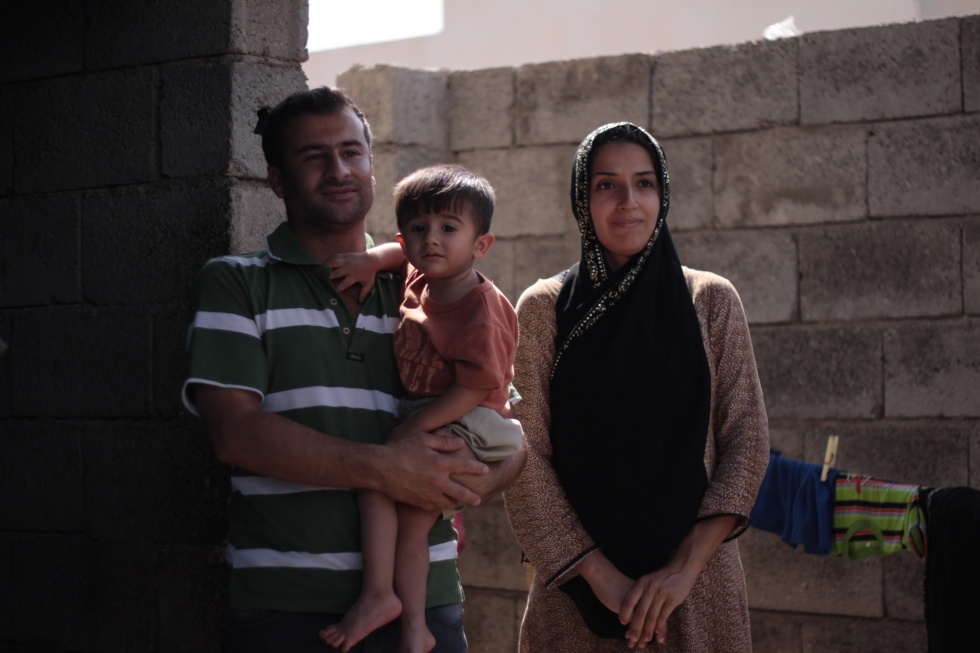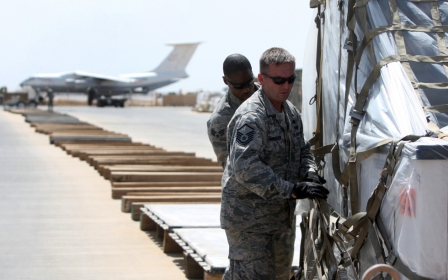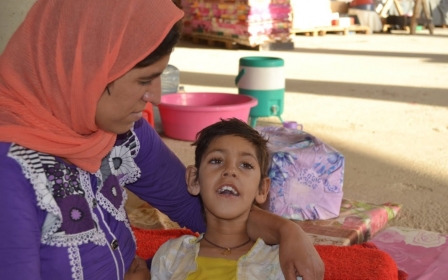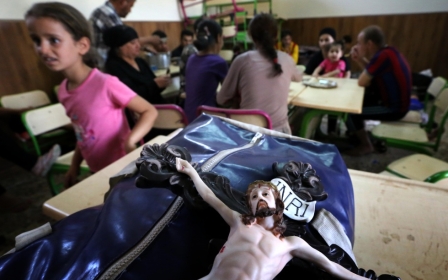Dismal job prospects for Syrian refugees in northern Iraq

ERBIL - Ahmeed Kareem loved his job as a receptionist. Abu-Firas, the small hotel in the al-Saida Zainab district in Damascus where he worked, was popular with foreigners, especially French and Germans. Ahmeed was an adept multi-tasker: He could recommend restaurants, book historic site visits, arrange transportation to and from the airport, call technicians to mend the spotty internet connection at the hotel, and advised his guests on the best black market spots to exchange money in the city. That was three years ago.
Now Ahmeed is one of more than 215,000 Syrian refugees who have fled to Iraq to escape the ongoing civil war that has so far claimed more than 191,000 lives. Ahmeed sits on a cold concrete floor covered with a thin red carpet in a dimly lit room, part of an unfinished house under construction. In the middle of the room stands a small round wooden table with a tray of rice, grilled vegetables and flat bread on it. It is noon and a Kurdish neighbour had just dropped by to deliver lunch.
Ahmeed, his wife, Shema, 32, who is seven months pregnant, and their son, Mohamed, have been living on this abandoned construction site in the Sarbaste district in Erbil, the capital of the Kurdistan Region of Iraq, for the past three weeks.
Ahmeed and his family escaped from Syria more than two years ago this July after a traumatic series of events in Damascus.
When the civil war started, Ahmeed's first wife died, something he prefers not to discuss. Then, he lost their only daughter, Nareen, and one of his brothers during a rocket attack that destroyed their apartment.
“Nareen ran to my brother’s house when the shooting started. I have not seen my brother or Nareen ever since that day,” he said.
Another brother, Anur, 32, was killed by Syrian government forces.
“We had to go to the local prison, and they handed me back the body of my brother with a bullet in his head, saying that the rebels did this to him. After that incident we knew we had to leave.”
After two months in Dohuk, Ahmeed and Shema, who met in Syria when she was working in a clothing store opposite the Abu-Firas hotel, reached Erbil, where Ahmeed was lucky enough to receive a residency permit and find a job as a construction worker, despite the reluctance of local business owners to hire Syrian refugees over other skilled foreigners.
“It was very hard and the hours were long, but the money was enough to rent a small apartment in the city,” said Ahmeed, who looks much older than his 31 years.
Three weeks ago, however, his boss told him that he had to let him go. “He told me that all of his construction projects had snapped to a halt," Ahmeed said.
An economic turn for the worse
The economy in Iraqi Kurdistan has taken a turn for the worse in recent weeks, mostly due to budgetary disputes with the central government in Baghdad, which has refused to pay the wages of Kurdish Regional Government (KRG) government employees - a severe shock for an economy where approximately 70 percent of the work force is on government payroll.
The KRG and Iraq are still feuding over the question of oil exports, the lifeline of the Kurdish economy. Despite some international oil companies such as Chevron and Afren, that have evacuated staff, the KRG plans to quadruple its oil exports via an oil pipeline to Turkey in the next three months. Baghdad opposes these plans, and a complicated legal battle is currently under way keeping investors in limbo. The advances of the Islamic State (IS) and the interruption of supply chains have additionally severely impacted economic life with rising fuel prices and a drop in consumer demand.
"The very large public sector employment heavily influences the macroeconomy of the Kurdistan region," said Dr Anwar Anaid, Professor of Political Economy at the University of Kurdistan. "Baghdad refusing to honor its budgetary obligations has reduced the level of money in the economy and consequently there less demand overall within the economy of Kurdistan."
Moreover, the war with IS has caused the displacement of approximately 230,000 Iraqis since August 2014 alone, most of whom have sought refuge in Kurdistan. This influx has strained an already overburdened economy that has absorbed more than 210,000 Syrian refugees in the past three years. In total, Kurdistan now hosts 1.4 million internally displaced Iraqis and refugees.
“The Kurdish economy was hit by the recent war between the Kurds and the militants of the Islamic State, but also has suffered as a result of the budget crisis. Most Syrians work in the construction sector, or hotels and restaurants. It is most likely there is less work at the moment," said Wladimir van Wilgenburg, an analyst with the Jamestown Foundation.
Iraq is last choice
If numbers are any guide, Iraq is a last chance saloon for Syrian refugees whose country, ahead of the civil war, was a safe haven for more than a million Iraqis escaping their country's war. Lebanon which now shelters 1,175,000 Syrian refugees, followed by Turkey with 832,000, and Jordan with 632,000 have received the bulk of fleeing Syrians.
Going to Iraq, he admits, was Ahmeed’s least favourite choice. The young family first tried Turkey, and then Jordan, but they were refused entry. They then travelled to the Iraqi border in their car.
“We saw many bodies littering the roads,” Ahmeed recounted. “The Peshmergas saved us, since we had no water and no food when we reached the border. They gave us supplies and drove us to the camp in a pickup truck.”
The UN High Commissioner for Refugees (UNHCR) classifies refugees into a camp and an urban population. A total number of 90,000 out of the 215,000 Syrians live in 10 camps clustered around the three big Kurdish cities of Dohuk, Erbil and Sulaymaniya. Ahmeed and his family are part of the urban refugee population that, with 120,000 people, constitutes the majority of Syrians in northern Iraq.
When asked why he chose not to live in one of the camps, he said he needed to be closer to the city to work.
“When we were living in a camp near Dohuk for two months, I could not find any work because the camp was too far away from the city for a daily commute, and I left my car behind at the [Syrian/Iraqi] border . . . I need to work to support my family," he said.
The majority of Syrian refugees in Iraq come from the rural al-Hasakah governorate in northeastern Syria, and many have only received rudimentary educations. According to an economic survey conducted by UNHCR in April 2014, “Syrian refugees in the KRI have fewer opportunities to build a livelihood than the local population, especially in camp contexts, and often face barriers when seeking to access labour markets.”
The study further finds that only 20 percent of camp refugees are “fully able to meet their household basic needs,” and more than 47 percent have had no source of income for their household in the past 30 days.
For better educated Syrians like Ahmeed, there is often no other choice than to leave the camps in order to seek employment, which also means abandoning the safety-net of camp life, an even riskier choice than normal, given the economic climate.
Unlike refugees in camps, said Edward Colt, a senior UNHCR spokesperson in Iraq, the urban refugees compete for limited resources with Iraqis who have fled their towns as well as locals in hard-pressed host communities.
Dim prospects, family needs
Now looking for jobs after losing his construction work, Ahmeed confirms that his prospects are dim.
Because he and Shema live illegally on the abandoned construction site, they have not registered their new location, making them ineligible for aid. Shema has not been able to see a doctor.
“We have not had support from any NGO since we moved to Erbil. We can only rely on the goodwill of our Kurdish neighbours here,” she said.
UN teams know that many refugees prefer not to live in camps and make efforts to travel to areas where refugees are living to determine their needs, but it can be hard to fully assess such a fluid situation, Colt said.
“Clearly, when Syrian refugees do not register, there is no record of them, which makes it difficult to provide aid," he added.
As difficult as Ahmeed's situation is in Iraq, he feel determined to continue on: not only is he supporting Shema and Mohamed, but he his parents, who sought refuge in a Kurdish-controlled town in northern Syria, rely on him.
On occasion, he is able to talk to them by phone. He admits that even before he was laid off from his construction job, he was not able to send anything to Syria.
“It was too little, and I could not find a safe way to transfer the money.”
Nevetheless, Ahmeed said he will not give up: “I have to find another way to support my family.”
New MEE newsletter: Jerusalem Dispatch
Sign up to get the latest insights and analysis on Israel-Palestine, alongside Turkey Unpacked and other MEE newsletters
Middle East Eye delivers independent and unrivalled coverage and analysis of the Middle East, North Africa and beyond. To learn more about republishing this content and the associated fees, please fill out this form. More about MEE can be found here.




